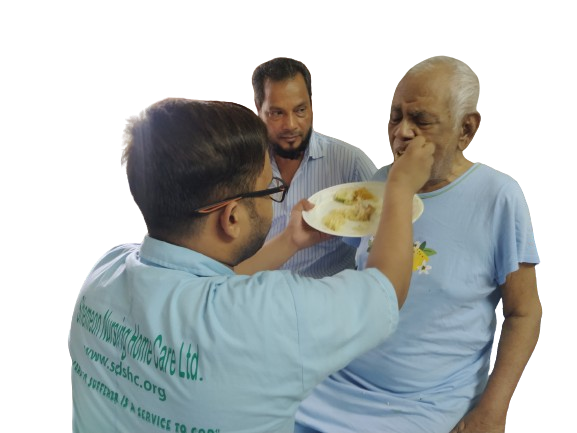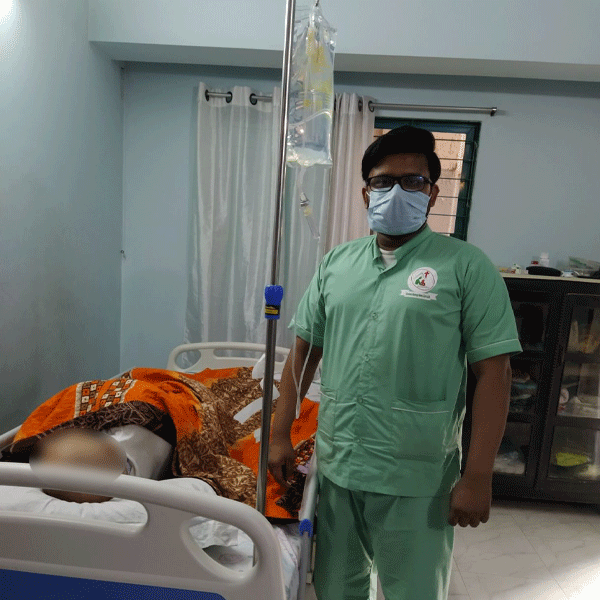Physiotherapy Services
We are Committed to
All Clients are Supervised Regularly
Regular Home Visits. Evaluation and monitoring integrated nurses progress. Revising update nursing care plan. 24/7 Phone Support.
Your Choice
Your care is completely determind by you. You determind the type of care, How it is delivered and who delivers it.
SUPPORT FOR YOU 24/7
Our tem are on-call 24/7, so we can help you when you need us the most.
LEVEL : 1 (RN)
Critical Care Nursing : Where require continuous vitals monitoring such as ICU, HDU, NICU, PICU, Neuro - ICU , Patients,. Which covers Tracheostomy (TT) care, Pressure Sore Intake Output, PEG / NG, Feeding tube, Suction & Nebulization, CV / Dialysis Catheter Care, CPAP - BIPAP, Ventilated and daily others necessary nursing care.
LEVEL : 3 (NT)
Nursing Technician : General Nursing Certified Care Based experienced to manage daily bedside care needs. Such as NG Feed Suction, Chest Physiotherapy, Inaulin given and many more bedside care activities according to nursing care plan.


ALLOCATION
6 (Six) Hours.
8 (Eight) Hours.
12 (Twelve) Hours.
24 (Twenty four) Hours.
Emergency Medical Support.
LEVEL : 2 (RN)
General Care Nursing : Will take wound care to Basic life support care. eg ; NG Feeding, Suction & Nebulization, IV Cannual, Urinary Catheter, Minor Dressing, Medication and other routine nursing care.
LEVEL : 4 (PCA)
Nursing Technician : Community Care Assistant (CCA) : Designed to assist with your daily bedside Necessity. eg; Helping to bath, Oral Feeding, Diaper Changing, Positioning, Mobilization, Walking Support and many more.
Caregaiver have been screened PTB & Vaccinated.
Drug & alchol abuse background check.
Trained about basic infection control & CPR, AED.
Our Documentation
If you need urgent care, simply call our 24 hour emergency hotline.
Your personal case manager will ensure that you receive the best possible care.

Frequently Asked Questions
There are a wide variety of conditions that can benefit from physiotherapy services. Physiotherapy can help patients with acute injuries, such as sprains, strains, and fractures, as well as chronic conditions like arthritis, back pain, and fibromyalgia. Physiotherapy can also be helpful for patients recovering from surgery, stroke, or other neurological conditions. In addition, physiotherapy can address issues related to balance, gait, and mobility, making it useful for patients with mobility impairments or those at risk of falls. A physiotherapist can evaluate a patient’s specific condition and determine if physiotherapy would be an appropriate treatment option.
Physiotherapists create individualized treatment plans by evaluating the patient’s condition and identifying their specific needs and goals. They may use a variety of assessment tools, including range of motion tests, strength tests, and functional tests, to determine the patient’s current abilities and limitations. Based on this evaluation, the physiotherapist will develop a treatment plan that is tailored to the patient’s specific needs, goals, and preferences. The treatment plan may include exercises, manual therapy, education, and other interventions designed to address the patient’s specific condition and improve their overall function and quality of life. The physiotherapist will also monitor the patient’s progress and adjust the treatment plan as needed to ensure that they are making progress toward their goals.
Physiotherapy uses a wide range of techniques and modalities to help patients improve their physical function, reduce pain, and promote healing. Some common techniques and modalities used in physiotherapy include:
Exercise therapy: This involves using specific exercises and activities to improve strength, range of motion, and flexibility.
Manual therapy: This includes techniques like massage, joint mobilization, and stretching, which are used to reduce pain, stiffness, and muscle tension.
Electrotherapy: This involves using electrical stimulation, ultrasound, or other modalities to promote healing and reduce pain.
Heat and cold therapy: This includes using heat or cold to reduce inflammation, swelling, and pain.
Education: This involves teaching patients about their condition, how to manage their symptoms, and how to prevent future injuries.
Assistive devices: This includes using devices like braces, crutches, or walking aids to support patients during their recovery.
Functional training: This involves practicing activities of daily living to help patients regain their independence and improve their overall function.
The specific techniques and modalities used in physiotherapy will depend on the patient’s condition and individual needs, as well as the preferences and expertise of the physiotherapist.
Maintaining the benefits of physiotherapy after treatment ends is an important aspect of long-term recovery and can help patients to maintain their physical function and quality of life. Here are some ways that patients can continue to benefit from physiotherapy after treatment:
Continue with home exercises: Physiotherapists often provide patients with exercises to perform at home to help them maintain their strength, flexibility, and range of motion. Continuing to perform these exercises regularly can help patients to maintain the progress they made during their treatment.
Stay active: Staying physically active, such as by participating in regular exercise or physical activities, can help patients to maintain their physical function and prevent future injuries.
Practice good posture: Practicing good posture throughout the day can help to reduce strain on the body and prevent future injuries.
Use assistive devices: Patients may continue to benefit from using assistive devices, such as braces or walking aids, to support their recovery and prevent future injuries.
Seek follow-up care: Patients should continue to see their physiotherapist or other healthcare provider for regular check-ups and follow-up care to monitor their progress and address any new issues that may arise.
By following these strategies, patients can maintain the benefits of physiotherapy and continue to improve their physical function and quality of life.
During a physiotherapy session, patients can expect their physiotherapist to evaluate their physical abilities, assess any limitations or pain they may be experiencing, and develop a personalized treatment plan to help them improve their mobility, strength, and overall physical function.
The specific techniques and modalities used during a physiotherapy session will depend on the patient’s individual needs and the goals of their treatment plan. However, some common techniques that may be used during a session include:
Manual therapy: This involves hands-on techniques such as massage, joint mobilization, and stretching to help improve mobility and reduce pain.
Therapeutic exercise: Physiotherapists may prescribe specific exercises designed to improve strength, flexibility, and range of motion.
Heat or ice therapy: The use of heat or cold therapy can help to reduce pain and inflammation.
Electrical stimulation: This involves the use of electrical currents to help reduce pain, improve muscle function, and speed up the healing process.
Ultrasound therapy: This uses high-frequency sound waves to help improve blood flow and reduce pain.
During a session, the physiotherapist will guide the patient through their exercises and techniques and provide feedback on proper form and technique. They may also adjust the treatment plan based on the patient’s progress or any changes in their condition.
What Our Client Says




















